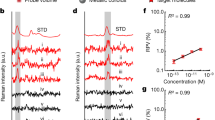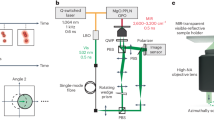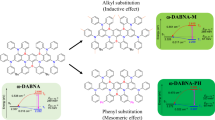Abstract
ACCORDING to the classical theory of protein structure, the carboxyl and amino groups found after hydrolytic splitting of a protein come from –CO–NH– bonds. According to the cyclol hypothesis (Wrinch1), however, the free carboxyl and amino groups must be formed, during the splitting, from bonds of the structure >C(OH)–N<. The classical theory would predict on hydrolysis no great change in the absorption spectrum below 2400 A. because the CO groups of the amino acids and of the peptide bonds both are strongly absorbing in this region2. On the other hand, the cyclol hypothesis would predict a greatly increased absorption because of the formation of new CO groups.
This is a preview of subscription content, access via your institution
Access options
Subscribe to this journal
Receive 51 print issues and online access
$199.00 per year
only $3.90 per issue
Buy this article
- Purchase on Springer Link
- Instant access to full article PDF
Prices may be subject to local taxes which are calculated during checkout
Similar content being viewed by others
References
Wrinch, D. M., NATURE, 139, 798, 972 (1937).
Cf. Magill, M. A., Steiger, R. E., and Allen, A. J., Biochem. J., 31, 188 (1936).
Author information
Authors and Affiliations
Rights and permissions
About this article
Cite this article
HAUROWITZ, F., ASTRUP, T. Ultra-violet Absorption of Genuine and Hydrolysed Protein. Nature 143, 118–119 (1939). https://doi.org/10.1038/143118b0
Published:
Issue Date:
DOI: https://doi.org/10.1038/143118b0
This article is cited by
-
Der endozellul�re Eiweiss- und Nukleins�ure-stoffwechsel in embryonalem Gewebe
Chromosoma (1941)
-
The Cyclol Hypothesis
Nature (1940)
-
Absorption Spectra of Proteins
Nature (1939)
Comments
By submitting a comment you agree to abide by our Terms and Community Guidelines. If you find something abusive or that does not comply with our terms or guidelines please flag it as inappropriate.



